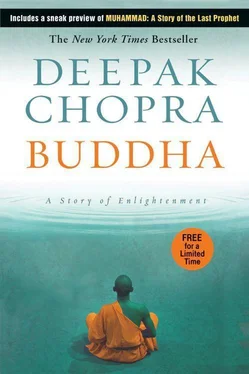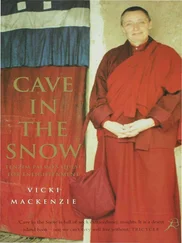Sitting in meditation while your nose filled with the smells of rice and lamb cooking over a fire was pure agony. A warrior’s discipline, by comparison, was child’s play. The young monk always lost focus: he salivated; his stomach growled. But this particular night he didn’t have to beg. One of the men sitting around the campfire noticed him and took pity. Siddhartha was startled to see him carrying an ax as he approached, but then he realized the men were woodcutters.
“Namaste,” he murmured, bowing his head. The woodcutter, a lumbering, thickset man, made no reply. Namaste was the simplest form of hello, but from a monk it was also a blessing: I greet what is holy in you. Siddhartha noticed that without thinking, he had put a harmless tone in his voice. So in a single word he had said, “Hello, I bow to your sacredness. Please don’t hurt me.”
“What are you hanging around for?” the man said gruffly.
“I saw your fire,” said Siddhartha. “I should have headed for a village, but it got dark too soon.”
“Someone like you isn’t going to get very far.” The man was scowling now. “What’s your name?”
“Gautama.” Siddhartha held his breath. He had taken on his family name, which was known everywhere. But for centuries it had also been a clan name, and many common people carried it.
“Well, you didn’t get any food today, Gautama, that’s clear enough.”
The young monk had practiced saying the name in his head-Gautama, Gautama-but this was the first time another person had used it. Losing his old name was the start of losing his old self. He felt forlorn and victorious at the same time.
“You’d be better off with an honest living that doesn’t depend on another man’s sweat,” the woodcutter said.
Gautama hung his head. If this was a taunt, it was better not to look him in the eye. Exhausted or not, Gautama still knew how to defend himself like a warrior. (When suspicious characters would stare at him and wait by the road while he passed, his hand had reflexively reached for his sword hilt before he remembered that it wasn’t there.) He forced himself to have humble thoughts. You’re a holy man. Let God protect you.
Now the stranger was holding out something. “Take it. You can’t expect any food without a bowl, can you?” He pushed forward a smooth hollow gourd, split in half and filled with steamed rice and potatoes. “I’d ask you to the fire, but some of the others-” He nodded in the direction of the group huddling in the mouth of the cave. None had turned their heads to look at the stranger crouching in the mud. “They’ve had bad run-ins with monks.”
Gautama nodded. In the month he had been wandering, he’d heard tales of criminals and madmen who assumed the disguise of monks so they could roam the countryside undisturbed.
“A blessing on you, brother.” Gautama said this with complete sincerity, and he continued looking into his benefactor’s eyes rather than diving into the food. He knew that his accent gave away that he was high-caste. He touched the man’s arm in gratitude, and the woodcutter was startled. Sometimes, very rarely, a high-caste warrior or noble might take up the life of a wandering monk, but they never touched anyone of low caste, even as beggars.
“And a blessing on you,” the man said. He got up and walked back to the fire.
As a sannyasi, one who has completely renounced the world, Gautama was allowed no possessions other than his saffron robes, a walking stick, a string of prayer beads around his neck, and a begging bowl. A monk ate out of his bowl, and when he was done, he washed it in the river and wore it as a hat to keep off the sun and rain. The bowl was what he drank from, and while he was bathing in the river he rinsed himself with it. Gautama turned the gourd around, admiring its simplicity.
Once he had eaten the food the woodcutter gave him, Gautama got to his feet, trying not to groan from the cracked blisters on his soles. He took a last, longing look at the fire-the men were drinking and laughing loudly now-and began slip-sliding through the mud toward the road. You couldn’t sleep too near the roads because of bandits. As he walked, he wrapped his arms around his thin frame for warmth and tried to find resignation. It’s just rain. This is nothing important. I accept it. I’m at peace. But resignation was empty peace, with no real satisfaction. What else could he try? Reverence.
Holy gods, protect your servant in time of need.
Repeating a prayer felt better, but his mind wasn’t fooled by reverence, either. It injected an ironic aside: If the gods wanted to protect you, why did they leave you out in the rain? Gautama was astonished at how many ways his mind could plague him. It blamed him for everything-for his blistered feet, for getting lost in the forest, for making a bed from tree boughs that turned out to be full of lice. Hadn’t Prince Siddhartha’s mind been calmer before he left home? Sick of arguing with himself, Gautama began to count his steps.
One, two, three.
It was a feeble trick to keep his doubts from attacking him. But he had too many memories, the kind that he couldn’t escape on the longest road.
Four, five, six.
The worst memory was of leaving his wife, Yashodhara. She had refused to watch Siddhartha ride beyond the gates. “Go at night. Don’t tell me when. It would be like having my heart broken twice,” she said. Her face was careworn with the tears she had shed. The two had been married almost ten years. It was such a love match that they had never spent a single night apart.
Yashodhara kept silent the first few days after he made his intention known, but they shared a bed, and one night she found her voice, softly, next to his ear. “Isn’t love enough, being here with me?”
Siddhartha wrapped his arm around her. He knew this question cost her an effort. If he said no, she wasn’t enough, Yashodhara would feel like a widow when he left. If he said yes, he had no argument for leaving. After a moment he said, “You are enough for this life.”
“Are you looking ahead to the next one?” she asked.
“No, not that. This life is only part of who I am. I need to know everything, and I can’t by staying here.” His expression was deeply serious, although she couldn’t see his face in the dark. “How can I know if I have a soul? Ever since I was a boy I’ve assumed I did because everyone says so. How can I know if the gods are real? Or that I came from them?”
“Knowing everything is impossible,” she said. Siddhartha sighed and held her closer. “It won’t be forever,” he promised. Yashodhara tried to believe him despite her experience. Everybody knew of husbands who ran off into the forest and never came back. Becoming a sannyasi was a holy act, but respectable men left it for old age.
Many men waited until they were seventy, especially if they had money, and the richest built lavish summerhouses that were a mockery of spiritual retreat. But all kinds of ne’er-do-wells ran away early. It was something you did if life got too hard or you had too many mouths to feed.
Yashodhara realized that some monks had a genuine calling. One day, despite her sorrow, she told her husband, “I know you have to go. I’m your wife. I feel what you feel.” But scandal burned her cheeks anyway; a prince of the blood deserting his kingdom was worse, infinitely worse, than some farmer deserting his barren rice fields.
Seven, eight, nine.
Gautama’s mind wasn’t falling for the feeble trick. You nearly killed her, it said with bitter accusation.
Ten, eleven, twelve.
People can die of grief. How would you feel then?
Gautama winced, remembering how much Yashodhara had suffered as his departure neared. Every night made her dread that she would wake up alone in the morning. There was nothing she could do for him, not even to pack little things for his new life. On the other side of the palace gates a beggar’s existence awaited. Suddhodana, now enfeebled with arthritis, had mustered up a brief, reproachful rage, as in the old days. “You can’t give me one good reason,” he shouted. But the lit fuse sputtered out, and after that his father ignored the whole subject.
Читать дальше












